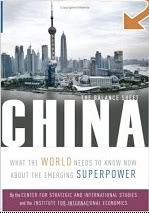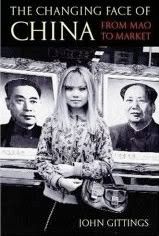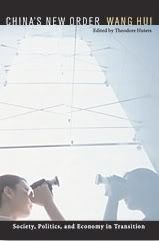WTO: A Tool for Growing Capitalism in China?
by Satya J. Gabriel
This essay was written for the Center for Popular Economics newsletter (from July 22nd plenary talk at CPE Summer Institute).
Why is the current leadership in China pushing so hard for entry into WTO? Why is China’s membership so crucial to both transnational firms from both the European Union and the United States, as well as Taiwan, Japan, South Korea, and Australia? In whose interest is China’s membership in WTO?
Since the economic reforms began in 1978, foreign trade between China and the rest of the world has grown dramatically. Exports now make up approximately 20% of GDP (approximately half of these exports are goods assembled from imported parts and then exported out of China by foreign transnationals). The domestic market in China is rapidly developing, showing every indication of becoming, within as little as another generation, at least as important as the United States as a mass market for global suppliers of everything from computers, cell phones, and other electronic goods to automobiles, refrigerators and other consumer durables. China is already at least as important as the United States in terms of incremental growth in imports, which has certainly not escaped the attention of top-level managers at transnationals. The best way for these managers to meet their growth targets is to develop an effective strategy for selling goods into this fast growing Chinese market. In East Asia, China is already becoming a more important trading partner than the United States for a number of countries, including South Korea.
Most importantly, China’s economic institutions have accumulated massive hard currency (primarily U.S. dollar) reserves. These hard currency reserves are critical to the so-called four modernizations of the Chinese economy and military. Hard currency is needed to import advanced technology (both in hard and soft forms) and to give the Chinese leadership bargaining clout in its dealings with the United States and the European Union. Indeed, the pragmatists (pro-capitalist members of the Communist Party of China (CPC), many of whom were labeled as such by Mao and his closest allies) have made the continued adoption of more advanced technology a cornerstone of their economic development strategy and achieving equal status with the USA and EU a cornerstone of their international relations strategy. These strategies have won them the support of the leadership within the People’s Liberation Army (often seen as the swing faction within the CPC). Therefore, as long as foreign technology is necessary to modernization (of the economy and military) and hard currency is necessary to obtain such technology, then support for export growth will be built into the political dynamics in China.
But does this mean WTO is the only way to go? Is WTO the necessary, if not sufficient, condition to keep those hard currency earnings flowing into China? Most economists probably think this is the case. They believe that continued normal trading partner agreements with the United States, for instance, are linked to China entering WTO. Indeed, China’s foreign exchange earnings from the United States are substantial (the trade imbalance between China and the U.S. is larger in absolute terms than any such imbalance between the China and any other country and between the U.S. and any other country). China's trade surplus now accounts for 3% of GDP. And China is already, without WTO, second only to the United States as a recipient of foreign direct investment (another potential source of advanced technology transfer and hard currency earnings). China is rapidly becoming the world's biggest "low-cost" manufacturer, flooding the global marketplace with relatively cheap electronics and appliances. Taiwan has led the way in developing manufacturing (mostly reprocessing) plants on the mainland, taking advantage of the relatively low wages and high productivity (very high rates of exploitation, in Marxian terms) and a substantial percentage of China's exports are the fruits of foreign firm production in China (rather than indigenous Chinese firms). This has led some to label China "the world's sweatshop."
China's domestic economy has long been lusted after by transnationals eager to gain customers in the world's most populous domestic economy and to exploit China's natural resources and relatively low cost (and abundant) workforce. The pragmatist faction in firm control of the CPC has made investing in China all the more attractive by adopting the most liberal foreign direct investment (FDI) rules in any of East Asia's major economies, far more open than the rules in Japan and South Korea. Yes, you heard that right, without being a member of WTO, the Chinese economy is already more open to foreign direct investment than an old and rich capitalist bastion like Japan.
So I have to ask again, why does the Chinese leadership need to join WTO? What is to be gained? The Chinese leadership has already demonstrated a sterling ability to fashion individual agreements with countries and generate enviable trade and FDI numbers. Why not just forge ahead and ignore WTO? We should not presume that the eagerness with which U.S. and European firms have pursued business interests in China would wane in the absence of WTO membership. It is likely that the existing pressure from transnationals upon their host governments to make it easier to do business in China would continue unabated, even if somehow the train to WTO derailed.
In other words, there must be more motivating the drive for WTO, especially within China. One could argue that the Chinese leadership is simply too weak to resist the push by the American government to join WTO and, by doing so, open the Chinese economy to American firms and farmers. Those who argue that this is the case imply that the potential negative consequences on Chinese firms and farmers is not something the Chinese administration would accept if not for this external pressure. Afterall, WTO comes with a long laundry list of strings attached, binding agreements that force “sovereign” governments to change their economic rules of the game. Given the current mono-superpower status of the United States, it is not difficult to conclude that the growing pervasiveness of these supranational rules of the economic game must be in the interest of American firms and farmers. And, on first glance, such external intrusions upon the sovereignty of the Chinese government would seem to be something to be avoided, particularly given Chinese sentiment about such external coercion (and very much active memories of “Western” imperialism in China). Indeed, there is opposition within the Party to the growing role of foreigners in Chinese economic life, especially from the Left. But perhaps it is precisely this continued struggle within the Party over policy that is the reason for the pragmatists pushing so hard for WTO. They recognize that the long-term struggle within the Party between themselves and the Left (including the remaining Maoists) may be in a relatively quiet period but is hardly over. The pragmatists may be using WTO as a mechanism for forcing more rapid and deeper pro-capitalist changes in China’s economic rules over the objections of the Leftist minority. In other words, WTO provides a convenient tool for defeating the Left within the CPC.
In addition, WTO provides the current leadership with a fall guy for the problems that developing a competitive capitalist economy, linked to the expanding global capitalist economy, have produced. Restructuring of Chinese state-owned enterprises has resulted in a rapid increase in unemployment, street demonstrations, and sabotage. The rise of the Shanghai engineers to leadership of the Party has resulted in a less ancient (self-employed) farmer friendly administration. The shift from pro-peasant policies to urban-bias, coupled with all too frequent corruption at the village level, has sparked farmer protests. The potential for even more wide scale anti-government demonstrations increases with each new set of plant closings and lay-offs and the increasing inequality between "town and countryside," regions, and between individuals in different "class positions." The fact that membership in WTO has been promoted as crucial to continued economic prosperity in China and that the United States and the European Union are seen as forcing China to make major concessions provides the pragmatists with the raw material for blame shifting. They can blame the growing unemployment and other economic ills on the U.S. and E.U., saying that they (the pragmatist leadership) had little choice but to cave into the demands, even if it cost many Chinese their jobs. Those who argue that the Americans coerced the Chinese leadership into joining WTO are, in this scenario, playing exactly the tune that the pragmatists want to hear. Nevermind that the pragmatist-led government was already moving to decisively end the old life-time employment system (a key component of state feudalism) and had already melted the iron rice bowl of social welfare and social security. The Chinese government's role in shaping the current transition to competitive capitalism may be obscured by the rapid penetration of the Chinese domestic economy by foreign-based transnational firms as WTO provisions are implemented, resulting in sharp tariff reductions and the fall of the Great Wall of non-tariff barriers.
And recognizing that the Party’s old constituencies, the farmers and urban wage laborers, may become disenchanted with the reforms as rural incomes stagnate and unemployment rises, the leadership is moving to change its base of support to the new capitalist class that it is creating. The Party recently began recruiting more members from the ranks of capitalist “entrepreneurs” and managers.[1] This would further dilute the strength of the Left within the Party and build a foundation for even more dramatic reforms in the future. It will also create the basis for the Party and government being captured to serve the interests of a narrow constituency that is more focused on individual profit than social development.
It could all backfire, of course. The growth of Chinese capitalism brings with it the increased potential for social unrest, particularly in the context of a Thatcherite/Reaganite reduction in the central government’s provision of social services (another aspect of the reforms). Millions of Chinese are now without access to good quality health care. A social security system is still in the planning phase, even as the elderly find it increasingly difficult to obtain services that had once been considered a right of citizenship. Young people are becoming increasingly unhappy with what they see as a culture of corruption and selfishness. Photos of Mao are once again starting to proliferate. The form of competitive capitalism being promoted by the pragmatists is a new world for the Chinese population to inhabit. To make matters worse, many of those most likely to adapt to these changes, the better educated and technically trained workers --- those most needed by Chinese firms hoping to effectively compete against foreign firms in both domestic and foreign markets --- are taking advantage of the opening up of the Chinese economy by joining foreign firms at pay levels well in excess of salaries in similar Chinese firms. This results in a subtle but continuous erosion of Chinese competitiveness from within. The problem will only worsen under WTO. Finally, the assumption on the part of the Party leadership that the legitimacy of their continued rule rests on economic growth may prove overly simplistic. It could turn out that the contours of this new world are not recognized as consistent with the ideals of the People's Republic. If that should turn out to be so, a serious crisis of legitimacy (of continued one-party rule by the CPC) could already be in progress. If WTO should exacerbate the problems that competitive capitalism have already generated --- for example, by causing rural incomes to fall, rather than simply stagnate, as cheap American agricultural goods cross the Pacific and enter Chinese cities --- then all bets are off. Calling upon the citizenry of China to recognize the logical necessity of participating in WTO and reorganizing Chinese society according to the global dictates of the "West" may not be sufficient to resolve the crisis in favor of the CPC leadership.
In any event, the recent vote of the International Olympic Committee to accept China’s bid to host the 2008 summer games may have been a signal that the pragmatists have succeeded in convincing the so-called West to play ball with an increasingly capitalist China. WTO entry is next. Whether this is in the best interests of the Chinese people or even the global community (not simply the transnational firms) remains to be seen.***
Satya J. Gabriel, Professor of Economics Mount Holyoke College.
Link
Read more!



